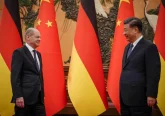 Unless you are following the story closely, you may not have noticed the worryingly slow progress of the “Modern Slavery” bill through parliament. It faces its third reading in early November, and so far there is no outright opposition. Of course no one is going to speak up for modern slavery. It is a dreadful thing, and no parliamentarian would defend it for a moment.
Unless you are following the story closely, you may not have noticed the worryingly slow progress of the “Modern Slavery” bill through parliament. It faces its third reading in early November, and so far there is no outright opposition. Of course no one is going to speak up for modern slavery. It is a dreadful thing, and no parliamentarian would defend it for a moment.
Instead, the delays have come from wrangling over wording, caused by the politics over immigration. The problem is that Home Secretary Theresa May describes the crime as “human beings used as commodities for the personal gain of others” (Hansard, 8 July 2014 col. 166), provoking the question of how this form of exploitation differs from other “everyday” exploitation faced by many (if not most) workers.
I am not the first to be struck by the problem of distinguishing the criminal exploiter from the wealth-creator. As Julia O’Connell Davidson has pointed out, the judgement as to what counts “as ‘appropriate’ and ‘inappropriate’ forms of exploitation and force” is essentially a political, rather than moral one[1]. Indeed Marx pointed out (in Capital and elsewhere) that the obligation of the worker to earn a wage or starve could scarcely be portrayed as the exercise of free choice.
In this case, the challenge for lawmakers is to define exploitation in such a way as not to make a larger proportion of capitalism illegal. Yet just as we see a cross-party consensus over the need to combat “modern day slavery”, so we see another consensus, this time all over the news, over the need for more restrictions on the right of migrants to work. Looking over their shoulders at UKIP, the two main parties are currently engaged in a gruesome competition to see who can sound toughest about cutting immigration – even from within the EU.
Notions of “free” labour are already contradicted by measures controlling (some) migrants’ access to the labour market. To give a few examples, apart from those from outside the European Economic Area who cannot lawfully work at all, there have been restrictions on migrants from new EU members states (to self-employment for a period of seven years), those on Tier 2 visas (to a named employer), on students (who may work, but not full time or in a profession), and on domestic workers (who may not seek another employer even if abused).
Of course, forced labour (a term which at least has an agreed definition, unlike “modern day slavery”) is a labour market phenomenon not solely affecting migrants. Statistics show that home country nationals can be subjected to exploitation every bit as extreme as can migrants. But one of the clear findings from the Joseph Rowntree Foundation’s research into forced labour is the difference between the power of workers and that of their employers is substantially increased for those whose right to work is restricted.
This can be most problematic for those whose very presence is unwelcome – those whose claim for asylum has been rejected, for example, who are in effect deliberately left destitute. But it is also the case for migrants who simply cannot leave an abusive employer. Few recall that migrant domestic workers had their right to change employers withdrawn in 2012. According to research conducted by UCL’s Virginia Mantavoulou, this has resulted in
salaries … as low as £50 per month…most range between £100-250. For almost all…no pay increase took place while in the UK, even if the employers said that this would happen. many … were not paid at all while in the UK. Most work very long hours, between 12 and 18 hours a day, and have no day off. (Evidence to Public Bill Committee, 2014/15 Session)
Based on this experience, it is reasonable to predict that more restrictions on the right to work will result in more workers being unable to resist these sorts of oppressive conditions. And yet this is exactly what is being proposed by both government and opposition. Far from reducing abuse in the workplace, further restrictions on working migrants will increase the supply of workers who are most easily subjected to exploitation. Many are outraged over the recent increase in the qualifying period for protection from unfair dismissal to two years’ service and the introduction of fees for employment tribunals, but migrants without the entitlement to work lack even these meagre protections.
In short, more immigration restrictions mean more unprotected workers. While they agree on how dreadful the consequences of such vulnerability can be, party leaders are blithely arguing for an intensification of the climate in which forced labour can thrive.
In labour market terms alone, this cannot end well.
This post is part of Migration and Citizenship, our series hosted in collaboration with Oxford COMPAS.
[1] O’Connell Davidson, J.(2010) New slavery, old binaries: human trafficking and the borders of ‘freedom’ Global Networks 10: 2 244–261







No Comment